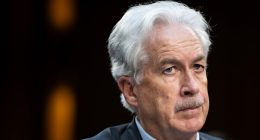
The London stock exchanges have been an engine for growth and innovation for 250 years.
London has been the leading financial centre in the world for much of that time. Now, however, it is in decline.
We are taxing the stock exchange out of existence. We tax every purchase on the main London market 0.5 per cent (a tax otherwise known as the stamp duty reserve tax – SDRT).
‘Not a lot,’ you might say. Yet, it’s 2.5 times higher than European Union countries charge. New York – our main competitor – does not charge at all.

Time for change: We need to scrap stamp duty on shares, says Interactive Investor boss
But it’s just a rich person’s problem, right? Wrong. It’s everyone’s problem.
Why? Markets live on flow, or in other words – on ‘liquidity’. If you tax one market and not the others, the flow leaves to the markets with no tax.
As this happens, the ‘buy’ and ‘sell’ prices get further apart (also known as the spread) which reduces the value of the shares compared to the untaxed markets, and this accelerates the process. Naturally, the more agile and dynamic businesses move first.
The result? Step-by-step the market decays and with it the jobs, talent, innovation, and growth with it. All pretty obvious really.
As the chief executive of the UK’s second largest investment platform, I cannot have this conversation without also outlining the detrimental impact this tax has for end-investors.
Ultimately, it is a needless barrier to investing and worsens end-investor short and long-term outcomes.
Why is it that stamp duty on UK shares remains unchanged in decades, but other investing costs have fallen dramatically? Why are we penalising investors for investing in UK shares, especially at a time when we want to encourage more of them to ‘back Britain’? It simply does not make sense.
This tax significantly adds to the costs of investing for retail investors. To illustrate, in 2023, the average amount paid by an ii customer on stamp duty on UK equities was £223, and a further £131 on UK trusts.
The total stamp duty tax paid by our customers was a staggering £27.5million. These costs add up, both in the here and now but also, crucially, in the future.
Costs matter hugely when it comes to investing as they compound over time – a stamp duty tax paid to the Government represents foregone compounded investment returns in the years to come.
It means UK investors are paying over the odds to ‘back Britain’ and it makes it harder for them to reach their financial goals. A lose-lose. Surely, that is not what we want.
We need the Government to recognise just how important this problem is, not only for the health of our markets, but also for our nation of investors.
The Government says it cannot afford to stop the tax, to ‘Stop the Stamp.’ The harsh reality, however, is that we cannot afford not to!
If we act now, I believe it will rapidly pay back in employment and growth. If we don’t, we will continue to see the best companies and talent leave.
For now then, do not be surprised to read that the UK stock market ‘looks cheap’, or that yet another tech firm is listing in New York, or that the UK is overweight on ‘old’ industries.
We must see a stop to this corrosive tax and allow the London market to recover its position and support the growth of the UK as the best place to do business.
This post first appeared on Dailymail.co.uk










